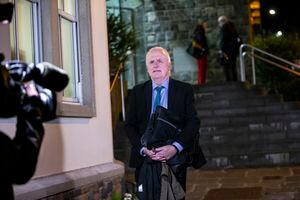Power and persuasion
Without executive power, politicians need to use charm and persuasion to win people over – and that has been in short supply in Guernsey’s principal committee, says Horace Camp

EXECUTIVE governments have a great deal going for them. I doubt Russia would have invaded Ukraine had the decision required a majority vote in a free Assembly. The same goes for the German invasion of Poland. Executive governments certainly get things done, but that doesn’t mean the outcomes will be beneficial.
Budding local historian Nick Le Huray reminded me in his excellent blog that once upon a time the States of Guernsey did indeed have a sort of executive and it was incredibly efficient in implementing the most challenging of policies. The example he gave was of the States nationalising all island businesses and taking on the task of paying every worker in cash every Friday.
A mammoth task and all without the benefit of modern technology or the assistance of Agilisys to implement a workable system. From start to finish the entire system took only days to implement after the German Commandant ‘asked’ for it.
Unfortunately, we live in a free, democratic society and I can understand why some members of the Policy & Resources Committee found themselves frustrated with being the one committee to rule all the others, but with no autocratic powers to make it happen. Unlike the centurion in the Bible – who, having soldiers under him, described that authority as ‘I say to this man, Go, and he goeth; and to another, Come, and he cometh’ – P&R had to use charm and the power of persuasion to make their fellow deputies come and go. But charm and persuasion were not their strong points.
I said right from the beginning that this line-up was not going to work. It could have worked if Deputy Ferbrache, in his own words ‘The Great Delegator’ – not just a delegator but ‘The Great Delegator’ – had decided to delegate to Deputies Le Tocq and Soulsby rather than the others. But it was not to be and so we are where we are.
If the last three years of the Assembly had been a sitcom, we would have laughed until we cried. In reality, it has been a tragedy, though our tears have not been of laughter, but of grief for what could have been.
The most tragic figure in the drama that has played out around us is undoubtedly Deputy Ferbrache. Although his humility would prevent him from saying it himself, he is a brilliant man and a true Guernseyman. Perhaps he needs to take a few lessons from Deputy Trott in trumpet blowing?
As I have said in a previous column, he fell in with the wrong crowd, which has led us to where we are today, which is up the long sea outfall pipe without a paddle.
He may not be an innocent victim in all this, but I have a great deal of sympathy for our current chief minister. He is of a similar age to me and we grew up in very different times. Much of what modern society deems unacceptable or acceptable is to me completely bonkers and I assume Peter sees it in the same way. In his defence of ‘robust’ meeting styles, he seems to weigh up a person’s contribution against their personality flaws, which was de rigueur in our day. Just about everything back then was acceptable if the person was good at his job. Times have changed and people now can be cancelled for using the wrong pronoun. If only Peter had set himself up as the fount of all honour within the States Assembly, and had adopted Deputy Le Tocq as his role model, then we might be in a very different place today.
The tone that was set on day one was ‘dog eat dog’, and that everyone should be fully aware of who the big dogs were. Politicking was replaced by fearmongering. The two camps went to war from day one and the people of Guernsey became the innocent victims of the strife.
Having listened to States debates on my wireless, I can personally attest to disgraceful comments and hidden slurs being commonplace, perhaps with a touch of misogyny as well. This terrible behaviour was not generally down to individual members of P&R, but was not pulled up by our principal committee.
Anecdotally, from very good sources, I have been made aware of far worse things happening behind closed doors, until it seemed to become quite normal for both deputies and officers to work within a toxic environment without even realising it was toxic.
The result was that when P&R, after years of operating in this manner, went out on a ‘charm’ offensive to win votes for GST, they failed time and time again. Individual members of P&R may have proved to be incredibly useful on technical matters but on the one thing they were elected to be, politicians, they were hopeless.
She’s not a member of P&R but Deputy Dudley-Owen recently commented that, as ESC president, she had been too busy working more hours than there are in a day, and more days than there are in a week, to approach all deputies before the vote on school funding, but if a deputy wanted to reach out to her then they knew where she was.
But a politician’s principal role is to get their policies passed and the funding obtained. To do that they need votes. Deputy Dudley-Owen’s one priority before the vote should have been to convince individual deputies to vote for her policy.
But doing, presumably, technical things did not leave her enough time to be a politician. She isn’t the only one who forgets the officers are the technocrats and the deputies are the politicians overseeing them.
I use this example to explain why I believe, at the very least, our principal committee needs to be staffed with politicians. Politicians don’t ignore or treat others in an offhanded way for three years and then expect those same people to both trust and vote for their policies.
If our current chief minister believes he has been a good leader, then he should resign and stand again for the leadership role, and see if he can win the mandate of the Assembly.
That would be the honourable thing to do, and it would leave the Assembly to get on with the real work of the States on 13 December, and end this ridiculous and long drawn out motion of no confidence debate.





